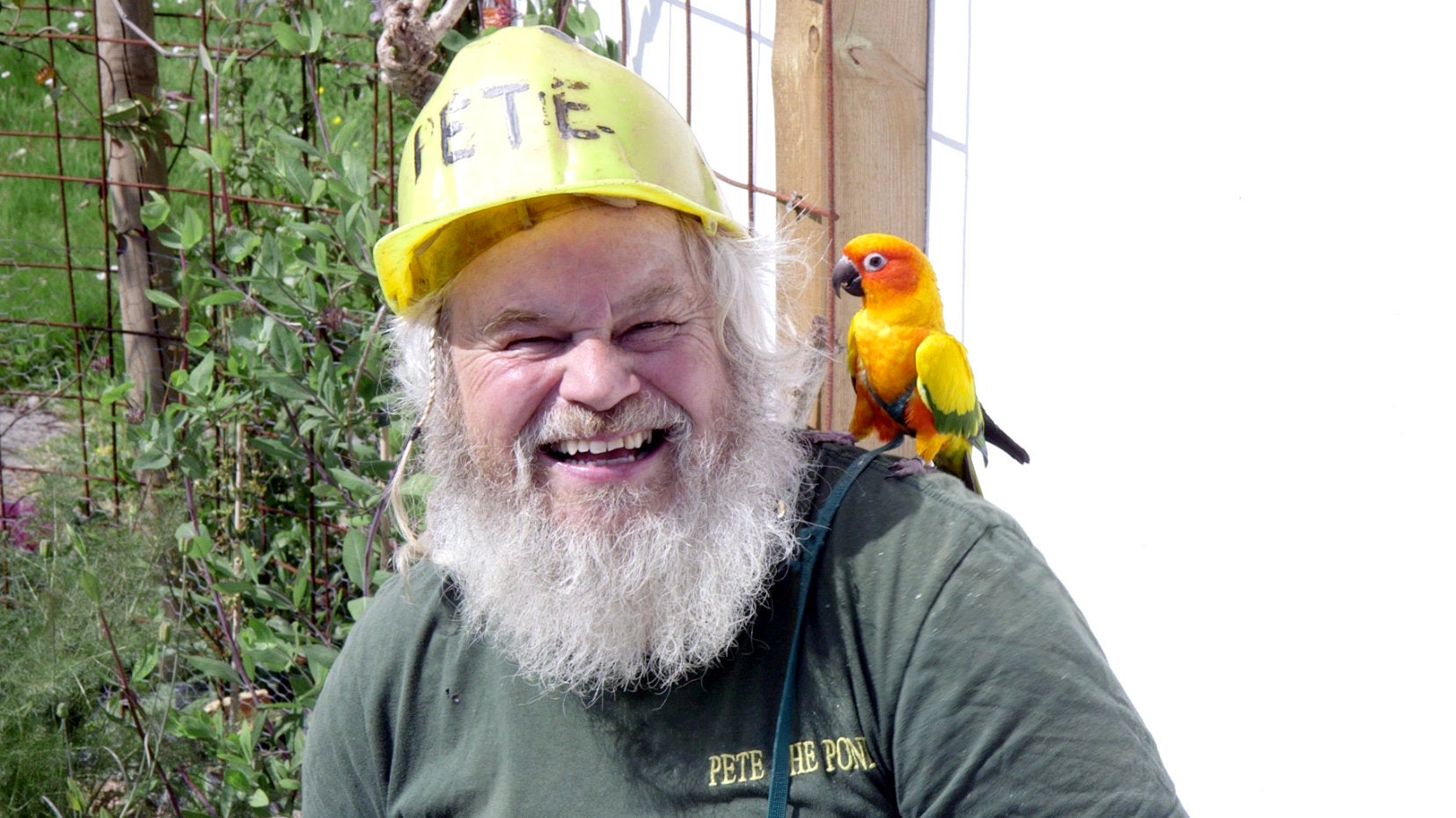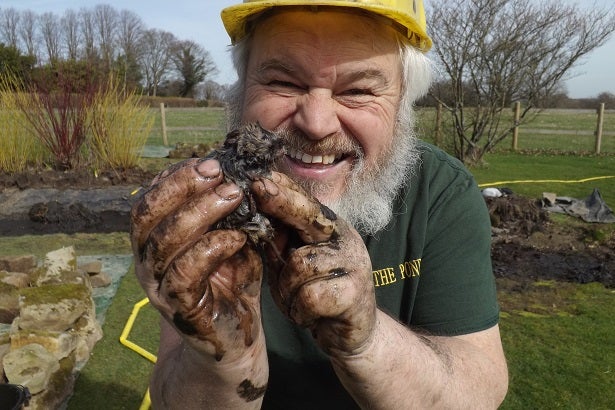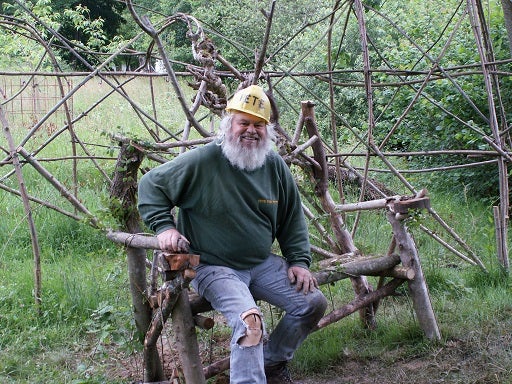‘My garden is a haven for creatures’: Meet Pete, the man with 45 ponds
Each pond is no bigger than a washing-up bowl and home to hundreds of plants and animals. But the council is threatening to pull the plug on Peter Birchall’s project. Jessica Brown reports

On a small residential close in Willingdon, near Eastbourne on the southeast coast, Peter Birchall shares his humble 50ft-by-30ft garden with 180 native plant species, a fox, and many other animals. “My neighbours just have lawn. There’s no biodiversity, their gardens are devoid of life. My garden is a haven for creatures,” he says.
When Birchall moved into his house 36 years ago, he inherited one pond, a lawn, a vegetable patch and flowerbeds. He’s since squeezed in 45 ponds, no bigger than washing up bowls, in which he keeps his plants.
“There’s all sorts of different creatures in there,” he says. “Each one is a different environment.”
Read More:
Over the years, his garden has hosted snakes, newts, toads, stoats, blue tits, crows, a green woodpecker and sparrowhawks, and used to be home to more than 100 frogs, until numbers started declining in recent years. Birchall does all this to help stop the decline of animal and plant species. He’s known as Pete the Pond on his social media and YouTube channels, where he shares what it’s like to run a pond-landscaping business.
He has private clients (including Steve Coogan), and works for organisations including schools and councils to bring ponds to life. His garden is also a treasure chest of materials he brings home from these jobs, where he recycles them into things like bird and insect boxes.
“I don’t like to put things into waste sites or landfill,” he says. “I try to reuse everything I can. If I’m making a pond, I take home offcuts of pond liner and find another use for it. “
But Birchall has built a lot of ponds over the years, and the materials he’s taken home have started to build up so much that a neighbour recently complained to the council.
In early March this year, Wealden Council visited the house with 45 ponds, and told Birchall he had less than a month to not only clear out the materials piling up in his garden, but to also remove all of his water plants. They quoted their legal right to take action in circumstances where the amenity of the local vicinity is negatively affected by the condition of someone’s land.
He believes that some of his plants can’t be found anywhere else in the country, and that some species he has might become extinct within the next few years
“Their attitude was very aggressive and demeaning,” Birchall says of the council officers who visited him. “They didn’t let me give my side of the argument.
“It’s an untidy garden because nature loves that. I should be praised, not condemned. I try to limit waste as much as I can.”
But Birchall doesn’t dispute that his collection of materials has probably become an eyesore to neighbours – although he takes issue with this material being called waste. He sees it as reusing and recycling things that would otherwise go to landfills to help improve biodiversity.
Birchall, who carries out his pond jobs with his parrot, Lottie, on his shoulder, has been working over the last few weeks to clear his garden of these materials. However, he insists that he doesn’t use his plants for commercial use, as he says the council has implied. “I grow plants in my garden and I give them to people to put into their pond free of charge. That’s still classed as ‘commercial’, according to the council,” he says.
In lockdown last year, Birchall spent his time organising his many plants and creating a reference library that can be used to help educate people. He believes that some of his plants can’t be found anywhere else in the country, and that some of the species he has might become extinct within the next few years.
Birchall often takes offshoots he finds while renovating ponds so he can propagate them, and he’s been given permission from various authorities over the years to take seeds from rarer plants.
“I put some of the plants into ponds as native aquatics because I want to increase biodiversity and save the wildlife we’re losing at such a vast rate.”
Birchall doesn’t have anywhere else he can keep his plants nearby. “I would love to keep the plants I have in the garden. If I have to move them miles away and I can’t water them every day, they’ll die and I’ll lose some of the rarest aquatic plants that are becoming extinct in most ponds in the country.

“Plants are my passion. I want to keep them in my garden to tend to and care for and increase knowledge of the importance of biodiversity.”
Birchall’s interest in ponds started to grow when he became a voluntary pond warden 20 years ago. He went on to set up his own pond-landscaping businesses, winning contracts from the National Trust and English Heritage. He also teaches children and adults about the role ponds can play in biodiversity, and often takes groups of Brownies and Guides pond-dipping.
Birchall says the council’s order has made him feel like his whole life has been shattered. “I feel like a headless chicken, totally lost, like my gut has been ripped out. I feel like I could break down and cry, I feel broken and lost,” he says. He likens it to getting a divorce when you don’t want one, and says he feels like the victim of a criminal act.
While in limbo, Birchall neglected the garden he usually spends as much time in as possible. “I can’t tend to the plants as I normally would, I can’t start heavily watering them and taking care of them, because they might have to be uprooted.”
After the council’s orders, Birchall reached out for support online. He started a campaign to get his story out, and received overwhelming support from former customers, strangers and celebrities, including Chris Packham. After a couple of weeks of growing attention on the case, Wealdon council has backed down – sort of.
The council says it aims “to negotiate and reach an agreed solution”.
“We only take matters further when necessary and proportionate, where there has been a breach of planning control that cannot be resolved by other means, there is also the right to appeal any formal action the council may take.
I got very stressed and upset, but I’m not one to lay down. Ever since I lost my leg, I get up and carry on with life
“Officers visited the site in response to concerns raised from local residents regarding the commercial use of a domestic property, untidy land and possible environmental health concerns.
“We continue to work with Mr Birchall to ensure a solution can be found which protects his wildlife garden and also maintains the residential qualities of the area in which he lives.”
Birchall says the council has agreed over email to let him keep the plants in his garden, as long as he doesn’t use them for commercial purposes. But he can’t fully relax quite until he knows exactly what the new conditions are regarding what he can and can’t have in his garden.
He also worries he’ll no longer be able to make insect and bird boxes from recycled materials he ordinarily brings back home from jobs. But one person’s old tree trunks turned into homes for insects are no different to another person’s regular garden compost heap, he says.
“Habitats built from logs and bits of wood are still classed as an issue – I’m not sure if I’ll have to take them down. But the habitats I build for creatures are part of my garden.
“Increasing biodiscovery is the main aim of what I do, putting back plants that are being lost in the environment. My plant collection is safe, but this curtails what we do, the ethos of my business, which is to improve and enhance nature.”
He adds: “I’m only out to help the environment, help nature’s species and fight invasive species and help the planet survive.
“We’re losing life at such a fast rate. We’ve got to address that; and this is what I’m about. The council should be supporting and encouraging what I do, but I’m being treated like fly-tipper. It’s awful and hateful.”

But the event that has happened on this little residential close over the last month hasn’t robbed Birchall of his love for life, neither in nature, nor his own – which he says he developed after losing his leg, and almost his life, in a motorbike accident at 18.
“I got very stressed and upset, but I’m not one to lay down. Ever since I lost my leg, I get up and carry on with life,” he says.
Birchall, who also moonlights as a pirate for the annual Hastings Pirate Day, says his injuries have led doctors to advise him to cut back on the physical work that’s part of his job.
“But there you go,” he says with a chuckle.
Now, Birchall has been advised to get any agreement he comes to with the council in writing. He knows he needs legal help, but can’t afford it.
“I work on a very small margin on my work. They say a man’s wealth is measured in the good they do for the world, and in that sense I’m incredibly wealthy. But money never played a real part in my life.”
If he doesn’t get a signed agreement with the council that his garden will be saved, Birchall is still confident that his campaign hasn’t been in vain.
Read More:
“I hope a lot of good will come out of this, that it will make more people aware of not cutting their lawns, of the importance of leaving insects with places to live, leaving piles of logs and bricks in the corner of their gardens for nature to have places to survive in.”
Birchall hopes to get back to life as normal, and get back to tending his garden. He’s also pleased he’s made so many new friends with people he’s met online who’ve been fighting his corner.
“Hopefully one day I’ll be able to show them my garden so they can learn from it. What a wonderful thing that would be. We’ve got London Zoo, why not come to Pete’s garden?”
Join our commenting forum
Join thought-provoking conversations, follow other Independent readers and see their replies
Comments